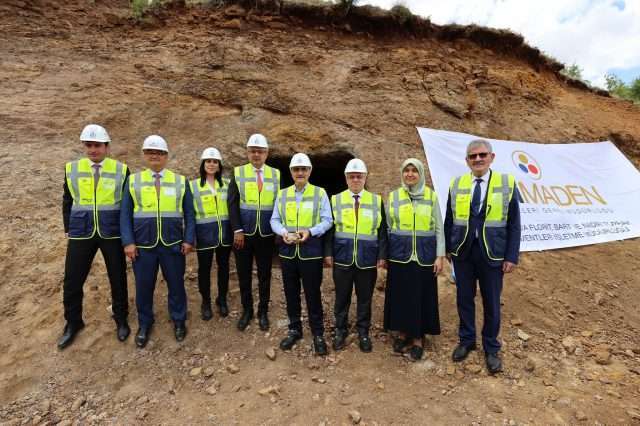Turkey discovered a massive reserve or rare earth elements

Author: Silvia Boltuc
The discovery of a massive deposit of rare earth elements in Turkey might change the geopolitical dynamics in the Eurasian chessboard since Ankara might challenge China, which has had the leading role in the market until now. Furthermore, this finding might change the domestic political scenario in Turkey and quiet doubts and disappointment about the country’s economic performance.
20 Jahre nach Viagra sucht Pfizer nach einem weiteren Wundermittel cialis 5 mg wirkungsdauer 0812-9844-0009 JUAL COD VIAGRA ASLI JAKARTA – Webflow
According to local sources, Turkey discovered 694 million tons of rare earth element reserves in the Beylikova district of Eskişehir. The reserve, which contains 17 different earth elements, was recorded as the second largest reserve in the world after China’s 800 million-ton reserve.
The Turkish Minister of Energy and Natural Resources, Fatih Dönmez, stated that this discovery “made history” and explained that:
“Earlier this week, our president announced this discovery in the Address to the Nation Program after the Cabinet Meeting. Our work in this field goes back a long time, but the most concrete work begins in 2011, after moving to Etimaden (a Turkish state company specialising in mining and geology). 125,193 meters of drilling was carried out here in six years. 59,121 samples were collected from the field. These were analysed, and as a result of the analysis, 694 million tons of rare earth elements were discovered.”.
Minister Dönmez stated that they could produce 10 of 17 rare earth elements with the industrial facility to be established in the Beylikova Ore Field. Turkey aims to develop technology that will realise end products from the field.
Economic scenario
Due to their chemical properties, rare earth elements are essential for making high-tech products. They are a group of seventeen chemical elements, more precisely: cerium (Ce), dysprosium (Dy), erbium (Er), europium (Eu), gadolinium (Gd), holmium (Ho), lanthanum (La), lutetium (Lu), neodymium (Nd), praseodymium (Pr), promethium (Pm), samarium (Sm), scandium (Sc), terbium (Tb), thulium (Tm), yttrium (Yb) and yttrium (Y).
They are used in many technological devices such as superconductors, magnets, alloying agents in numerous metal alloys, catalysts, hybrid vehicle components, application of optoelectronics, optical fibres, and microwave resonates. Identifying them is challenging, and their extraction has a tremendous environmental impact. For this reason, with the growth of the population and the increase in demand, rare-earth elements have become valuable resources.
World reserves of rare-earth elements are found worldwide, but they are much more widespread in China, Brazil and Russia. China is the leading producer, and its largest deposit is located in Baotou.
From an environmental point of view, extracting and refining rare-earth elements might cause severe ecological problems because the substances pass through a series of steps that involve acids and filtration in several stages. These are multiple steps that generate substantial toxic waste. The worst effects might be the loss of biodiversity, water pollution, soil erosion and the formation of sinks. It has been calculated that processing one ton of rare earth metals produces around 2,000 tons of toxic waste. This is why recycling Waste from Electrical and Electronic Equipment, WEEE, is of fundamental importance. In this way, rare-earth elements can be managed correctly, recycled and put into new production cycles without requiring new soil extraction.
Geopolitical assessment
Since the discovery of rare earth elements on its soil, Turkey might become Beijing’s competitor in this industrial market and attract Foreign Direct Investments (FDIs) and the interests of Western companies. Indeed, since the leading Chinese role in rare earth elements extraction and production, the United States and the European Union have been looking for an alternative source to counter Beijing’s primacy. Considering the vast impact that rare earth elements extraction and refining might have, Turkey must implement modern infrastructure and technologies in the Beylikova Ore Field to avoid severe environmental problems.
On the one hand, the White House might exploit its relations with Ankara and Turkey’s NATO membership to become the principal investor or buyer of rare earth elements’ products and create friction between Beijing and Ankara. In this regard, Washington might also push Ankara’s Pan-Turkism strategy in Central Asia and the Uighur cause to contrast with China (Turkey and pan-Turkism in Central Asia: challenges for Russia and China). On the other hand, since Beijing has the expertise and know-how to develop rare earth elements deposits, China might offer help and investments to Turkey, trying to cement Turkish-Chinese economic relations toward the Belt and Road Initiative.
There is also scepticism about Ankara’s historical discovery among social networks and Turkish forums. Indeed, some experts and a part of the Turkish electorate argued that the Government published the discovery of rare earth elements to silence the doubts and uncertainties in the Turkish economy which has suffered a severe blow as demonstrated by the depreciation of the Turkish Lira. In addition, the comments gathered from Turkish newspapers and social pages stressed that the Turkish Government might use this discovery to catalyse the electoral campaign for June 2023.
